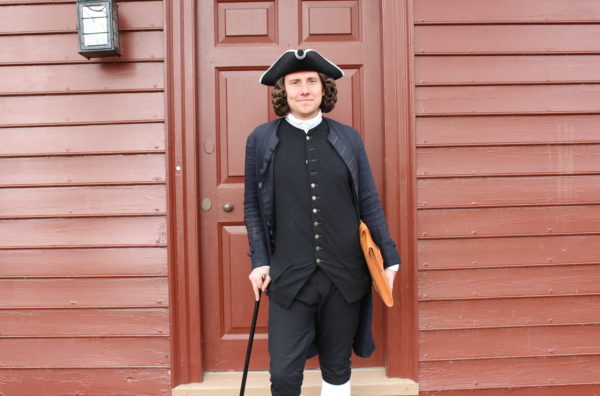
Washington wasn’t the only “George” to make major contributions to the founding of America. Another one, George Mason, helped to mold many of the ideas we hold dear as intrinsically American, yet he is unfairly neglected as a founder. You may suspect bias, as I’ve just undertaken the role of Mr. Mason in Williamsburg.
At first glance the two Georges do seem worlds apart. Washington travelled the wilderness as a surveyor and soldier, and led the Continental Army during the Revolutionary War. Mason preferred his home and farm in Northern Virginia, and spent the war years as a delegate in Virginia’s government. Mason had 9 children and 48 grandchildren who survived to adulthood; Washington had none. Mason wore a wig, Washington did not.
But they had much in common, too. Here are 5 similarities between these two Georges that stood out as I researched my new role.
#1 Fatherless Founders
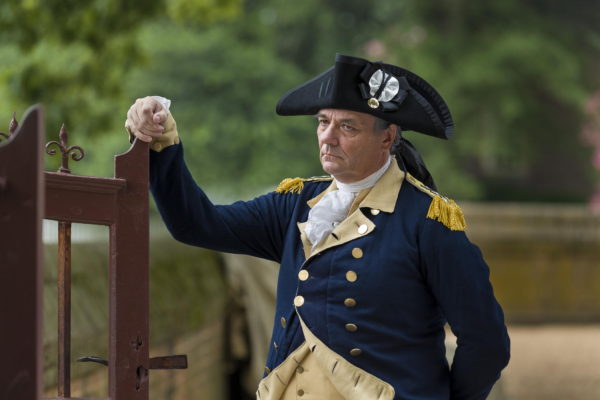
While the loss of loved ones was a reality of everyday life in the 18th century, newborns, children, and mothers were the most common casualties. Mason‘s father drowned in an accident while crossing the Potomac when he was not yet ten and Washington lost his father at eleven from an illness. Both were eldest children. Mason had a younger sister Mary, age 4, and brother Thomson, age 2. Washington had four younger siblings (and two older half-brothers). The death of their fathers coupled with the fact that neither of their mothers would marry again saddled both Georges with additional responsibilities at a young age. This responsibility would mold both of these men into the leaders they would become.
#2 Elders to Many Revolutionary Peers
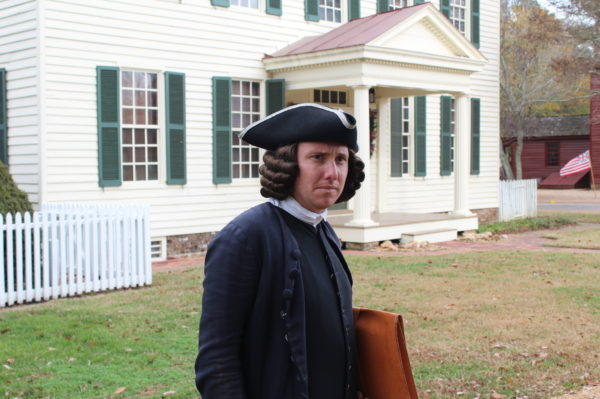
Mason, born December 11, 1725, was just over six years older than Washington (born February 22, 1732), but that meant both were considerably older than many of the other founders. During the French and Indian War, Mason acted as supply agent to the soldiers serving in Ohio territory, a group that actually included George Washington. This experience earned both the rank of colonel. When the Declaration of Independence was signed, Mason was 50; Washington was 44. Meanwhile Thomas Jefferson was only 33, and James Madison 25.
This meant that Mason and Washington, drawing on decades of experience, approached the American Revolution from a different perspective than their younger, perhaps more exuberant compatriots. At the Constitutional Convention in 1787, they commanded the respect that came with being elder statesmen. Mason was the fifth-oldest of the 55 delegates. Washington was ninth.
#3 An Incomplete Education
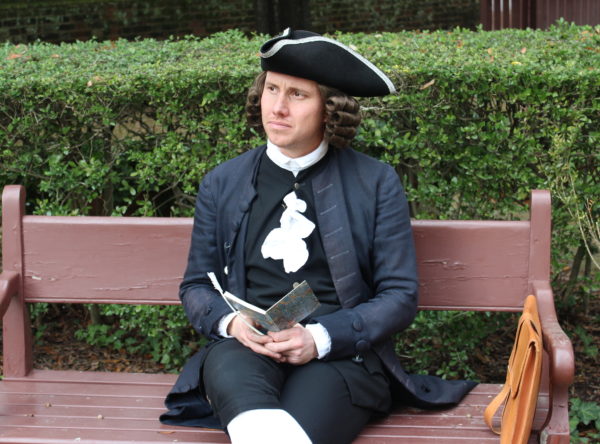
Perhaps due to the loss of their fathers and familial responsibilities neither of these men would have the opportunity to receive a formal education. In the 18th century going to college was a luxury and opportunity that we may take for granted in our modern day, but to many Virginians such an opportunity was out of reach. Mason and Washington studied under various tutors in their younger years but never went to a college or passed the bar to become lawyers like many of their revolutionary counterparts. In fact, Mason excused himself from the Virginia’s committee for the revision of laws on the basis that he was no lawyer. Later in life both men would express a sensitivity about their lack of education and stressed the importance of education on the children they raised.
#4 Neighbors on the Potomac
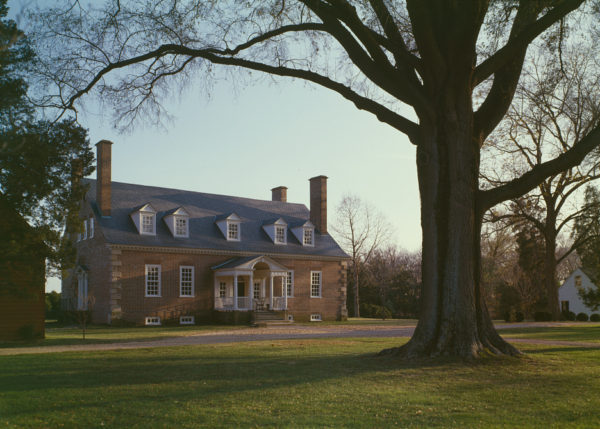
Gunston Hall
While Washington spent many of his formative years at his home of Ferry Farm in Stafford County and Mason spent time at Chopawamsic Plantation (west of Quantico) as well as in Maryland, these men would end up settling near one another along the Potomac River. Mount Vernon is only a few short miles north of Gunston Hall by boat (a preferred 18th-century travel method). Much like Washington, Mason inherited the property on which he built his cherished home and worked to improve the land.
We know their civil obligations meant that these men sat on committees together, were elected to the House of Burgesses in Williamsburg at the same time, and even shared responsibility as vestrymen for Truro Parish. But their correspondences were not confined to revolutionary ideals and political beliefs, they also wrote about local affairs, their respective families, and preferred farming techniques.
Throughout their lives they corresponded on many subjects. On one occasion Mason offered to help Jackie Custis, Washington’s stepson, while George was commanding the Continental Army in New York. The general responded with surprising warmth, writing, “I could think of no person in whose friendship, care and abilities I could so much confide, to do Mr. Custis and me this favour as yourself; and therefore, take liberty of soliciting your aid.”
The letters reveal their personal familiarity. In one Mason asked Washington if he would “be kind enough to get me two [pairs of] gold snaps made at Wms. burg for my little girls.”
#5 The Blemish of Slaveholding
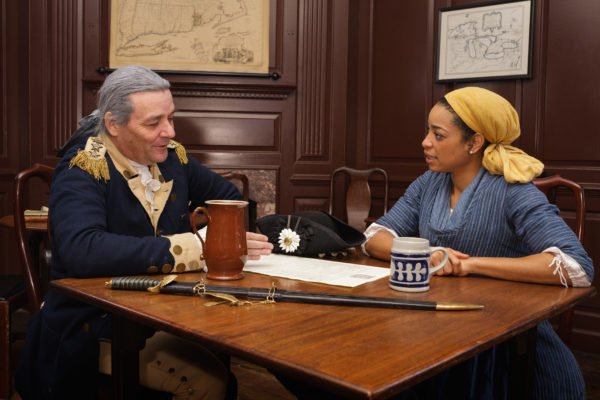
Last but far from least, the two Georges were among the largest slaveholders in Virginia. In 1782 Mason held 128 slaves, in Fairfax second only to Washington’s 188. The American Revolution highlighted the contradiction between the ideals of freedom and independence and the reality of slavery.
Both men struggled to reconcile their revolutionary philosophy with the slave society. Mason condemned the institution and declared that “every master of slaves is born a petty tyrant.” Likewise Washington wrote that he “wish[ed] from [his] soul that the legislature of this State could see the policy of a gradual Abolition of Slavery.” And yet these two men held slaves throughout their lives.
I hope you’ll come see me on Duke of Gloucester Street during the coming months, where we can continue the conversation.
GUEST BLOGGER: JOE ZIARKO
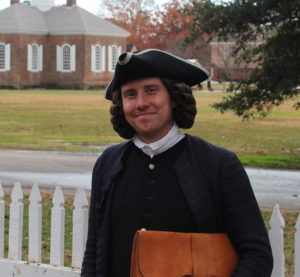
Joe Ziarko’s first stint at Colonial Williamsburg began nine years ago, shortly after he graduated from Dickinson College with a double major in American History and Theatre. He began as a theatrical interpreter, a logical extension of his “unique” educational combination.
As a member of our actor Interpreter team, Joe portrayed Edmund Randolph for several years. Coincidentally, Randolph, like Mason, refused to sign the Constitution. Joe says this is where he discovered a particular propensity for portraying less appreciated historical figures
After serving as Manager of Interpretation at George Washington’s Ferry Farm in Fredericksburg, Virginia the past two years, Joe returned to Colonial Williamsburg to take up the role of George Mason in August 2016.
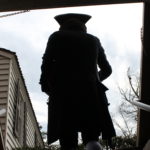
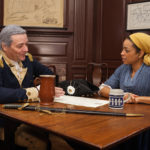
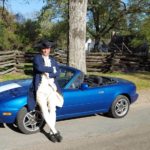
At this moment I am ready to do my breakfast, after having my breakfast coming yet again to read more news.
http://financetip.eu
I, too am not getting Making History as often as I used to receive them. I have mentioned it on FB, but got no replay. What gives?
PS Could you make this print darker. My eyes are not what they used to be and this is so light that I cannot see if I’m making typos or misspelling words.
Fyi, I am still not receiving Making History on a regular basis even though I resubmitted my gmail info last week. I’m very disappointed as I looked forward to the interesting information such as the two Georges. Hope the problem is resolved soon.
Why saddle Mason and Washington with the burden of “the blemish of slaveholding”? It was normal in their time to hold slaves and we know that arrangement was made for the manumission of most of the slaves. The vast holdings required labor and all labor is paid for, one way or the other. We know that the idea of slavery created conflicts in the minds of many of the slaveholders including the subjects of this article. I don’t think CW should join the rabble who are disparaging our Founders, a pattern of behavior that started with Jefferson, despite the weak science behind the supposed connection between TJ and one of his female slaves. It was not anymore of a blemish than it was a blemish for growers to use white indentured servants whose contracts specified a commitment to labor for a set number of years as payment for passage. Many CW supporters are getting tired of the Board and management of CW moving politically left and I am wondering when CW begins to support reparations. Too much emphasis is being placed on slaves, blacks, black preachers, Civil War, and other anachronisms. The story of CW should be the story of the Founders and the great thinking that came out of the Enlightenment and led directly to our Declaration of Independence and then our Constitution. Not who did the laundry. You wonder why you’re in trouble.
I believe the blog provides a balanced view of Mason and Washington with respect to slavery.. Given that slavery, as you pointed out, was generally (but not exclusively) accepted in the 18th century, it is to the credit of Washington and Mason that they questioned the legitimacy of that institution. They indeed recognized the “blemish” that was slavery. Blacks were a bit over 50% of the population of Colonial Williamsburg and a significant percentage of the entire colony’s population. To ignore their story is to provide a less than complete picture of Virginia in the colonial and revolutionary period. Thus far, Colonial Williamsburg is managing to tell the story of the movers and shakers while not leaving out the common folk.. I have not seen anything that leads me to believe it will not continue to do so. It is, however, necessary for friends of the foundation to be vigilant in that regard given the interest of many n the academy to discredit the founders. I credit you in doing so.. I have great difficulty with your suggestion of an indentured servitude/slavery equivalence.. For starters, many (but not all) indentured servants came to America voluntarily.. Slaves obviously were taken to this land against their will. A seven year period of servitude is by no means the equivalent of mandatory service to a master until death. After the seven year period of servitude is up, the indentured servant is free to move to the location of their choice.. A slave moves when the master relocates or sells the slave to someone else. . .
Thankfully, I work at a foundation where difficult conversations are welcome and real history can be discussed. Certainly Mason and Washington should not solely be saddled with the problems of American slavery. While holding enslaved Africans/African-Americans was not uncommon in the 18th century, their number of slaves alone and their traceable perspectives do make these two men stand out more than many others. This was a time in which Enlightenment philosophy ran counter to the economic realities of their day-to-day lives. Both of these men took opportunities to speak out against the institution at a time when silence and complacency were acceptable options.
Our intention is certainly not to disparage our Founders but to be honest about them. Nor should it be seen as disparaging to look at the ideas and realities with which they struggled. As historians we have obligations to look to all aspects that fed into the American identity, whether they are famous or forgotten, easy or hard, celebrated or cursed.